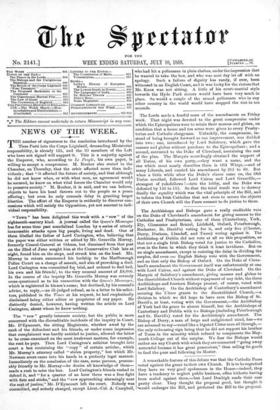The " row " greatly interests society, but the public
is more concerned with the discreditable incidents of the inquiry in Court. Mr. D'Eyncourt, the sitting Magistrate, whether awed by the rank of the defendant and his friends, or under some impression that complainant was hardly entitled to justice, allowed the latter to be cross-examined on the most irrelevant matters, for example, the rent he pays. Then Lord Carington's solicitor brought into court a box containing the " copy " of certain articles, which Mr. Murray's attorney called "stolen property," but which Mr. Newman even came into his hands in a perfectly legal manner. Immediately on the conclusion of the ease, some persons, presum- ably friendly to Mr. Murray—he denies all knowledge of them— made a rush to seize the box. Lord Carington's friends rushed to defend it, and "for a quarter of an hour there was a free fight with fists and sticks," and the "row approaching alarmingly near the seat of justice," Mr. D'Eyncourt left the court. Nobody was committed, and nobody charged, except Lieut.-Col. A. Campbell, who had hit a policeman in plain clothes, under the impression that he wanted to take the box, and who was next day let off with an apology. Such a failure of dignity has rarely, if ever, been witnessed in an English Court, and it was lucky for the rioters that Mr. Knox was not sitting. A little of his court-martial style towards the Hyde Park rioters would have been very much in place. So would a couple of the armed policemen who in any other country in the world would have stopped the riot in ten seconds.






























